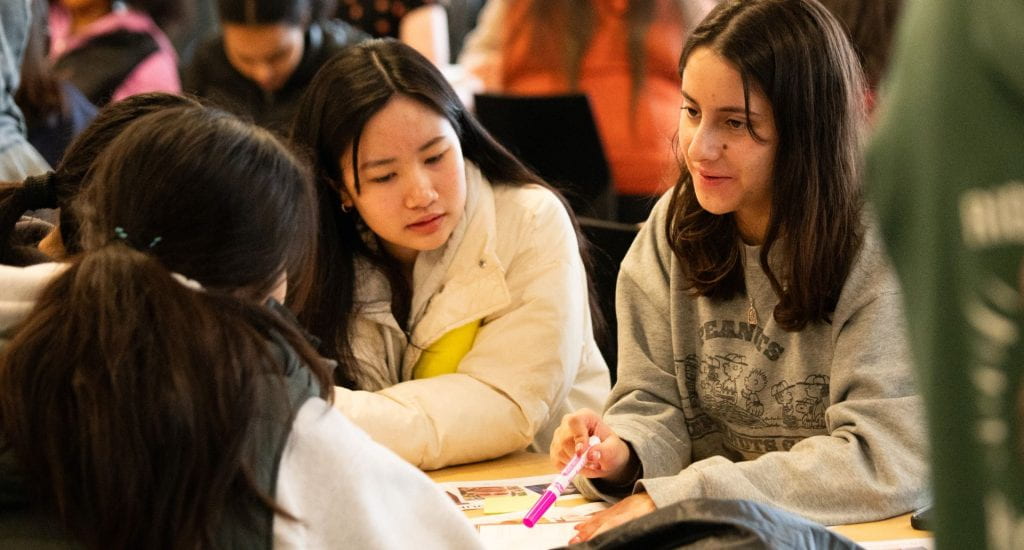News coverage from February 2023 about the Center for an Informed Public and CIP-affiliated research and researchers.
- ArtForum: “Miriam Felton-Dansky on the theater of Annie Dorsen”
The February 2023 edition of ArtForum magazine references WhichFaceIsReal.com, co-developed by CIP co-founder Jevin West, a UW Information School associate professor, and CIP faculty member Carl Bergstrom, a UW Department of Biology professor, in a feature article on the theatre of Annie Dorsen.
***
- Poynter (Feb. 3): “This newspaper doesn’t exist: How ChatGPT can launch fake news sites in minutes”
CIP research scientist Mike Caulfield was interviewed by Alex Mahadevan, director of MediaWise at the Poynter Institute, for an article about ChatGPT and “fake news” sites that could use the AI chatbot technology to create convincing but unreliable content. Caulfield observed: “Previously a well written, well laid out publication with headshots and bylines, etc., meant something … It didn’t always mean it was reputable, but there was at least a partial correlation between something looking that way and being known, or ‘real’ — even if ‘real’ and wrong. Signals of authority were expensive, and that formed a barrier to entry.”
***
- KIRO 7 News (Feb. 8): “AI goes mainstream with ChatGPT in Bing; experts warn of pitfalls”
In a sit-down interview, CIP co-founder and UW Information School associate professor Jevin West was interviewed by KIRO 7’s DeeDee Sun about the rise of AI chatbot technology like ChatGPT and the risks from misinformation created via AI technology.
***
- The New York Times (Feb. 10): “The 25 Tweets That Show How Twitter Changed the World”
A New York Times Opinion article about how Twitter “changed the world in 25 tweets” featured a March 6, 2020 tweet by CIP faculty member and UW Department of Biology professor Carl Bergstrom that is credited with helping explain how COVID-19 lockdowns could help “bend the curve.”
***
- KIRO Radio (Feb. 10): “Seattle’s Morning News with Dave Ross and Colleen O’Brien”
Jevin West and Carl Bergstrom spoke on KIRO Radio’s Seattle Morning News with Colleen O’Brien and Dave Ross about emerging AI programs, including ChatGPT.
***
- Seattle Magazine (Feb. 16): “Kate Starbird spends her career studying and combating falsehoods”
CIP director Kate Starbird, a UW Human Centered Design & Engineering associate professor, was featured in a Seattle magazine feature recognizing the “most influential” individuals in Seattle. The magazine writes: “Despite the stressful nature of the work, she believes it’s one of the most important things she can do as an academic and professor.”
***
- The Seattle Times (Feb. 17): “Why bad information can linger in your brain”
Is MSG really bad for you? Or you have been told it’s bad and that’s all you remember about it? In this article, CIP postdoctoral scholar Madeline Jalbert describes the “continued influence effect,” or why and how bad information tends to stay with us long after we have been informed about it.
***
- Business Insider (Feb. 23): “The new Bing is acting all weird and creepy — but the human response is way scarier”
CIP faculty member Carl Bergstrom, a UW Department of Biology professor and evolutionary biologist, was interviewed by Business Insider about a AI chatbots, writing that “Bergstrom has been an especially vocal critic of the tendency in the sciences and journalism to impute more personhood to chatbots than they deserve — which is, to be clear, zero.”
***
- CDT TechTalk Podcast (Feb. 25): “Post-election audits, disinformation, ‘rumoring’ and more”
CIP director Kate Starbird, a UW Human Centered Design & Engineering associate professor, was interviewed for Center for Democracy & Technology Tech Talk podcast, where she was interviewed by CDT’s Jamal Magby, William T. Adler, Aliya Bhatia about election and voting rumors, conspiracy theories and mis- and disinformation in the 2020 and 2022 U.S. elections.




